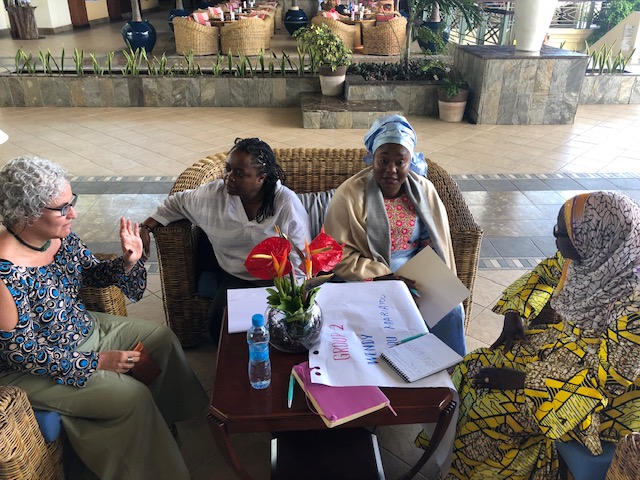Power, democracy and decolonizing philanthropy in the Global South: reflections from the Africa Philanthropy Network conference
10 Dec 2018
 Graciela HopsteinFrom 8 – 9 November, by invitation of the GFCF, I had the opportunity to represent the Brazilian Philanthropy Network for Social Justice – together with Maria Amália Souza of the CASA Socio-Environmental Fund – at the Africa Philanthropy Network (APN) Conference, held in Mauritius. The main theme of the conference was “Giving and power”, a strategic topic and one of great interest to me personally, but nonetheless still slightly unusual in the field of philanthropy.
Graciela HopsteinFrom 8 – 9 November, by invitation of the GFCF, I had the opportunity to represent the Brazilian Philanthropy Network for Social Justice – together with Maria Amália Souza of the CASA Socio-Environmental Fund – at the Africa Philanthropy Network (APN) Conference, held in Mauritius. The main theme of the conference was “Giving and power”, a strategic topic and one of great interest to me personally, but nonetheless still slightly unusual in the field of philanthropy.
Democratizing and decolonizing philanthropy (and conferences about philanthropy)
The GFCF organized a meeting the day before the conference opened, entitled “Building local resources and shifting power: A regional exchange on community philanthropy’s potential in Africa.” There were 25 participants representing various philanthropic and civil society organizations, primarily from English and French-speaking African countries.
One of the main highlights of both the conference itself and the GFCF convening was not only the fact that they addressed themes associated with the issue of power, but also that the “official languages” were English and French. And this is no small feat, since the “official language” is “normally” English at the different sector conferences that I attend. In fact, English is the “natural language” of the meetings that take place in the international philanthropic field. Recognizing the need to include other languages (in this case, French) was certainly one of the major deconstructions of both the conference and meeting. Considering that there is a direct relationship between language and power, I see the introduction of French in this setting as a political act (as it similarly would have been with the introduction of Portuguese, Swahili or any other language besides English), designed to promote inclusion and the democratization of access for groups that normally do not have the opportunity to express themselves and be present in these spaces of discussion and coordination.
The opportunity to participate in both events and follow the various debates was a highly enriching experience for me in terms of learning and reflection. I was particularly interested in conversations touching on the decolonization of philanthropy – a recurrent and transversal topic in conference discussions, and in my view an issue not restricted to the African continent, but something that is necessitated across the Global South.

Multi-lingual exchanges with participants from Brazil, Zambia, Niger & Senegal
More in common
Considering my home country of Brazil (which evidently has a strong historical and cultural connection with the African continent, with over 50% of the country’s population being black), there is a new trend around the emergence of locally-rooted organizations that mobilize local resources. These are largely related to corporate philanthropy and the trend is still in its infancy. But this is encouraging nonetheless, due to the fact that: local civil society organizations are overly dependent on international donors; in Brazil the culture of giving is centered around topics like education and the provision of services, rather than human rights and social justice; the sector is characterized by low investments in minority and vulnerable groups (black, women, and indigenous populations, amongst others[1]); and the lack of a grantmaking culture[2], which negatively affects the political and financial sustainability of civil society organizations and community-based groups (especially those working in the field of rights).
I could immediately recognize some of these trends in the picture of African philanthropy that was painted in Mauritius, particularly the dependence on international philanthropy to provide financial resources. Of course these resources are given (in both Brazil and Africa) with agendas attached, which usually have an effect on organizational strategies, areas of focus, policies etc. I bring this up not to create any tension or conflict between organizations accepting international funds while also building local resources – indeed, international philanthropy is still hugely important, particularly given Brazil’s current political scenario. On the contrary, I believe that the challenge we face is about how to better blend and maximize the different resources and efforts that are being pooled together to strengthen local philanthropic funds. This will require improved dialogue and cooperation between actors approaching the field from different angles, whether local or international, corporate or individual donors.

‘Changer la dynamique du pouvoir’ – the GFCF convening in Mauritius
What power are we talking about when we refer to #ShiftThePower?
Certainly, the community philanthropy agenda promoted by the GFCF, expressed through the #ShiftThePower hash-tag (which was also a theme running throughout the APN conference) can be understood as a development strategy that encourages – in fact, requires – dialogue and co-production. When local contributions are placed on the table, it creates different power dynamics, leveling the playing field. Horizontal accountability (ie. to the community) becomes as emphasized as vertical accountability (ie. to donors largely based in the Global North), thereby challenging the traditional “donor / beneficiary” dynamic. When local resources are mobilized, new forms of participation emerge. Community philanthropy is based on the premise that all communities have their own resources and talents (money, skills, knowledge, networks etc.), and when placed together, these elements give them power and voice. By contributing their own resources, communities feel autonomous, and become active subjects capable of promoting and protecting their collective interests to build a greater common good. In the words of Jenny Hodgson, GFCF Executive Director, community philanthropy “is a way of transferring power closer to the ground so that local populations and actors have greater control over their own destiny.”
The #ShiftThePower movement – which was launched around the 2016 Global Summit on Community Philanthropy – in my opinion makes the case for constituent power. According to contemporary Italian thinker Antonio Negri, constituent power should be understood as a force that interrupts, breaks, and undoes pre-existing power structures, and which is opposite to the idea of order, discipline and control inherent in constituted power (for example, the state).[3] Constituent power is the active, operative element common to all modern social movements, which encourages new forms of collective organizing. It redefines traditional (constituted) notions of power, and is not finite but can grow, organically, as new groups of people come together and exercise their common ability to act and resist. (Therefore with constituent power, “they don’t simply have a cause. They are the cause. They are the subjects of discourse and actions, because it is their bodies that suffer with the necropolitics associated with human and environmental exploitation”[4], also due to their condition of being excluded from “the right to have rights.”[5])
What I’m taking back to Brazil
Above all else, what I’m taking back to Brazil with me is an even more profound appreciation for the importance of networks. Particularly as different networks are trying to build local philanthropy in their own parts of the world, now is the time to exchange, discuss and support each other. We feel that the Brazilian Philanthropy Network for Social Justice can offer some significant experience in this area, as we work primarily on supporting and strengthening civil society, and accordingly, democracy. And it was wonderful for us to learn more about the APN’s experiences, and what they do across the continent to strengthen philanthropy and the culture of giving. I came back from the conference feeling inspired – the challenge now is to sort through all of the great ideas in my head!
By: Graciela Hopstein, Executive Coordinator of the Brazilian Philanthropy Network for Social Justice
Read this blog post in Portuguese
[1] Based on the GIFE Census (2016), 4% of investments are directed at women and 2% at ethnic-racial groups.
[2] The GIFE Census (2016) indicates that only 16% of corporate foundations and institutes work primarily focused on donating resources to social organizations, and 41% state they work in a mixed way, or in other words, developing their own programmes and donating resources to third parties.
[3] Negri, A., Poder Constituinte (“The Constituent Power”). Rio de Janeiro: DP&A, 2002
[4] Fred de Melo Paiva. O Bolsonarismo como ele é (“Bolsonarism as it is”). Revista Carta Capital, November 21, 2018. Available at cartacapital.com.br
[5] Arendt, Hannah, A Condição Humana (“The Human Condition”). Forense Universitária: Rio de Janeiro; 2016.

